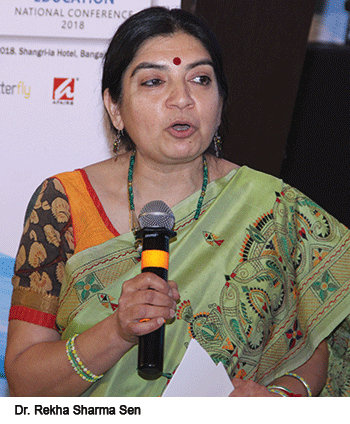 In 2013 towards the end of its second term in office, the UPA-II government approved a National Early Childhood Care and Education (NECCE) Policy. This was widely welcomed as it reinstated early childhood care and education on the national agenda, especially in light of the exclusion of the 0-6 years period from the Right of Children to Free & Compulsory Education (RTE) Act enacted in 2009.
In 2013 towards the end of its second term in office, the UPA-II government approved a National Early Childhood Care and Education (NECCE) Policy. This was widely welcomed as it reinstated early childhood care and education on the national agenda, especially in light of the exclusion of the 0-6 years period from the Right of Children to Free & Compulsory Education (RTE) Act enacted in 2009.
Though some significant efforts have been made by the Central and state governments to enhance the quality of services being provided to children during the critical early childhood years since the policy has been adopted, there are many challenges that remain to be addressed and there is urgent need for the NECCE Policy to be revived and implemented by the Union and state governments countrywide.
Following approval of the NECCE Policy by the Union cabinet, in 2014 the Union ministry of women and child development (MWCD) adopted the National Curriculum Framework for ECCE which laid out the principles for planning and implementation of ECCE services, with a focus on preschool education. This gave impetus to reviving the transaction of four hours of preschool education in the countrys 1.34 million anganwadis functioning under the Central governments Integrated Child Development Services (ICDS) scheme. Consequently as a first step, most states have developed local contextualised ECE curricula with support from state ECCE experts, based on the National Curriculum Framework document.
Anganwadi workers need to be trained to implement this newly developed locally contextualised curriculum and the government intends to do this through the cascade model under which master trainers are trained by the National Institute of Public Cooperation and Child Development, Delhi, who will train district-level trainers, who in turn will train anganwadi workers. While this training model has been initiated in many states, the long gap between imparting training down the layers of the cascade prompts drop in quality. Further, the duration of the training programme for the anganwadi workers is very short and inadequate to ensure understanding of concepts and skill building. Currently, an initiative is being planned to support the training of anganwadi workers through online modules but this programme is at a nascent stage.
While the ICDS programme has enabled a large number of children to access ECCE services, there are certain vulnerable groups of children which havent been taken into consideration while planning, e.g, children living on the streets, children of prisoners, nomadic and migrant children and terminally ill children who spend extended amounts of time in hospitals. Similarly, while policy formulation includes children with disabilities in ICDS, theres little effort towards making services accessible to them.
In 2014, ‘Quality Standards for ECCE’ was adopted by MWCD. These spell out minimum standards in eight key areas of service provision. However, not all standards are converted into measurable indicators across all the eight key areas. Further, assessment tools need to be standardised to be able to objectively assess the functioning of a centre, especially with regard to curriculum quality. While some national and state bodies have issued recommendatory guidelines for regulating early childhood care and education centres and ensuring quality, as of now, only a couple of state governments have taken the initiative of introducing registration and regulation in the sector. But the challenge is that while regulation applies to the private sector, there is no parallel regulation mechanism which would ensure provision of quality preschool education in government-run anganwadis.
Unfortunately, the status of the early childhood worker/preschool teacher is at the lowest end of the professional hierarchy in our country. Inadequate remuneration, varying duration and quality of training, and differing norms for recruitment in private preschools and government anganwadis are some of the unresolved issues affecting the quality of education for youngest children across the country.
Its also important that the curriculum and pedagogy of preschool years are connected with the early primary classes. However in 2014, the National Council for Teacher Education (NCTE), the apex body responsible for approving teacher education programmes, restricted the span of ECCE teacher preparation programmes up to the preschool stage. This is a retrogressive step given that the earlier NCTE norms included classes I and II under its early childhood teacher preparation programme.
The NECCE policy which is an excellent document, makes several useful recommendations relating to classroom size, teacher qualifications, appropriate curriculum and materials, and building the capacity of teacher education institutions. It also envisages the establishment of ECCE councils in states to facilitate implementation of the policy at the state level. These councils have yet to be convened in some states.
Yet, given that most ECCE centres and preschools in India are providing indifferent quality services to children in the 0-6 years age-group, the public interest requires urgent revival and implementation of the NECCE Policy countrywide.
(Dr. Rekha Sharma Sen is professor in the faculty of child development at Indira Gandhi National Open University, New Delhi)























